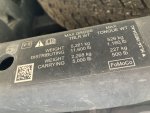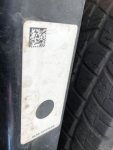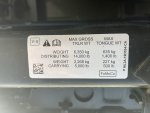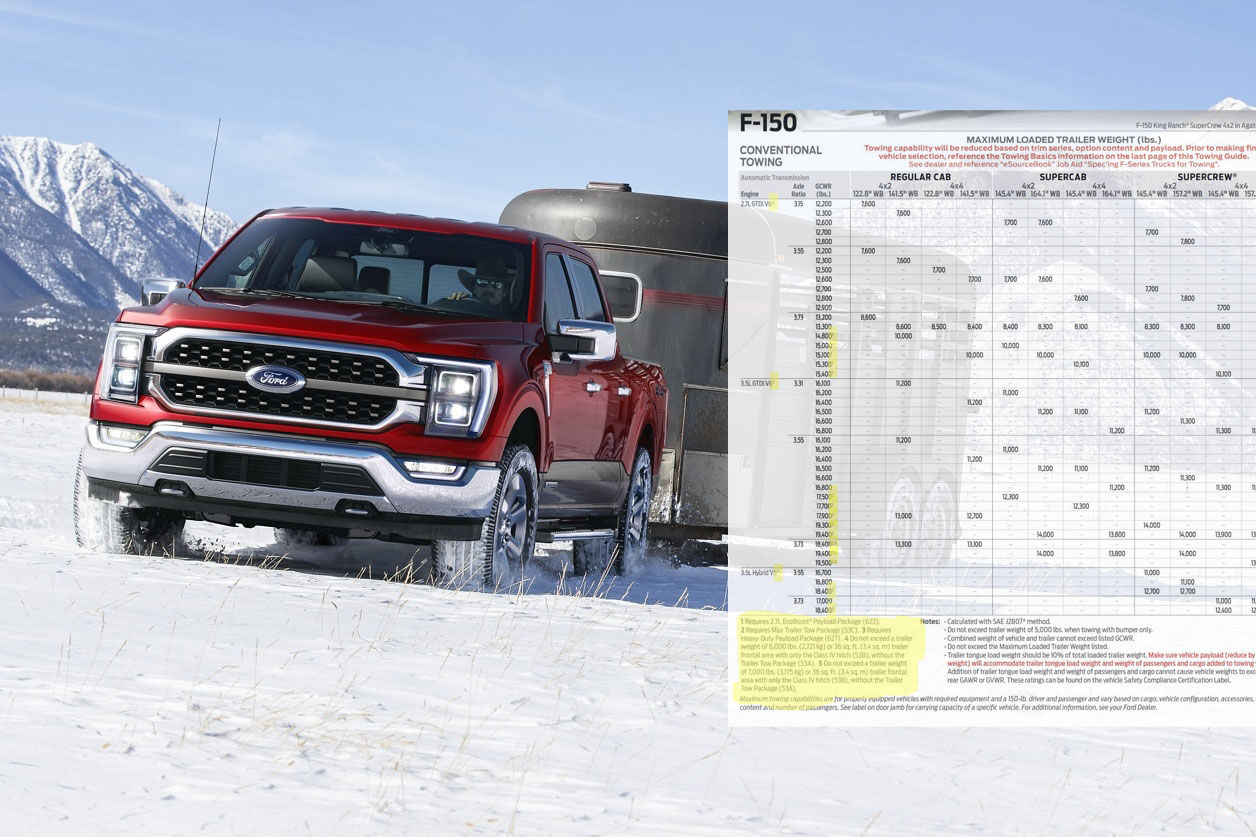TexasSixSeven
Observer
And there is a huge difference in a trucks capability between towing and hauling.The OP isn't talking about a camper that you tow behind the truck; the OP is talking about a truck camper that sits in the truck bed.
Get your tickets to THE BIG THING 2026!
And there is a huge difference in a trucks capability between towing and hauling.The OP isn't talking about a camper that you tow behind the truck; the OP is talking about a truck camper that sits in the truck bed.
Yes a truck camper vs a travel trailer. If I was hauling a lightweight truck Camper the tundra, if I was pulling a big travel trailer I'd buy the ram diesel. It's great that there is time before the camper arrives. Have fun shopping.The OP isn't talking about a camper that you tow behind the truck; the OP is talking about a truck camper that sits in the truck bed.
I what was going to agree with you but then I remembered I literally sold a Tundra and bought the F250 to carry out lightweight pop up?Yes a truck camper vs a travel trailer. If I was hauling a lightweight truck Camper the tundra,
The absolute maximum payload on a new Tundra is listed as 1,975 lbs on a 2WD SR. A 4WD 6.5' double-cab (not crew cab) has a max payload of 1,885 lbs. You put 2 adults and their daily stuff in the cab and you're looking at nearly 400 lbs right there, leaving 1400-1500 for the camper, food, fuel, water, clothes, etc. The Milner spec sheet shows a base weight of 1212 lbs. I don't care what you've seen it tow, that is NOT the new truck you go out and buy for the purpose of hauling a truck camper, and it's borderline irresponsible to even suggest that it is a proper candidate for that task. Even a lightweight truck camper often ends up weighing close to 2,000 lbs when loaded for a trip, and then there's passenger weight on top of that.Yes a truck camper vs a travel trailer. If I was hauling a lightweight truck Camper the tundra, if I was pulling a big travel trailer I'd buy the ram diesel. It's great that there is time before the camper arrives. Have fun shopping.
This raises an interesting question. Not only are they not held liable at all, there is in fact a *complete* lack of regulation regarding private half-ton and midsize trucks to go with this expansive aftermarket of companies willing and able (without liability) to bolt lots of unnecessary stuff to these trucks. No laws, no regulating govt agency, no DOT sticker or scale ticket requirements for non-commercial rigs with a GCWR under 26,000 lb. If it’s so grossly negligent and dangerous to drive on a highway while over GVWR by 500-600lb, why is this the case?Agree 110%
Doesn't mean they shouldn’t be held at least somewhat accountable
Peterbilt makes a nifty 367 series in 6x6 that lets you gross right around 70K pounds...I want that one.
Try towing a 9,000 lbs trailer with any 1/2 ton. I'm guessing you'd see the issue. My truck is rated for 14,000 lbs. No way I'd ever go near that. Currently I'm towing about 5,000 lbs wet. Looking at trailers around the 6,000 - 6,500 lbs dry mark. Any more than that, and I'd look at 3/4 - 1 tons. Just cause you can, doesn't mean you should.This raises an interesting question. Not only are they not held liable at all, there is in fact a *complete* lack of regulation regarding private half-ton and midsize trucks to go with this expansive aftermarket of companies willing and able (without liability) to bolt lots of unnecessary stuff to these trucks. No laws, no regulating govt agency, no DOT sticker or scale ticket requirements for non-commercial rigs with a GCWR under 26,000 lb. If it’s so grossly negligent and dangerous to drive on a highway while over GVWR by 500-600lb, why is this the case?
I’m not advocating for towing over your limits or severely overloading your truck, but if you’re in a Tundra rated to tow 9500lb, and you’re pulling a 9k lb trailer, I don’t see the problem. If Toyota rated the truck to tow 9500lb, then they also rated it to stop 9500 lb. The only number you’re over is GVWR due to tongue weight. And probably only by 500-600 lb. That’s still within combined GAWRs. For me, I’d rather have the Tundra than an HD truck. Remember that the first two million-mile Tundras regularly exceeded GVWR by a lot with heavy loads in their beds. The first guy hauled 2700lb on a regular basis. 77k miles/yr, no issues. ?
Maybe it’s just me, but I am FAR less worried about the guy pulling a 9k trailer in his Tundra with a tongue weight that puts him over GVWR—or a 1500 lb truck camper that puts him over GVWR—than I am the guy scrolling on his phone while driving. People doing the latter cause significantly more accidents.
My truck is rated for 14,000 lbs.
Oh yes, for sure. I was referencing an RV since we were talking about campers.Also, a 9,000 lb travel trailer or other enclosed trailer with a large frontal area and side profile tows much differently than an equally weighted flatbed or dump trailer. With properly adjusted trailer brakes and a good brake controller, I'd have no issue occasionally towing a flatbed or dump trailer with any load that didn't exceed the ratings of my hitch, axle, tires, etc. Even a 14,000 lb bumper pull trailer requires only about 1,400-1,500 lbs of tongue weight, which is well within the payload ratings for most stock half-tons with enough left over for a driver and maybe passenger. I don't recall ever looking at a hitch on a half-ton that wasn't limited to 10,000 lbs gross/1000 lbs WD tongue weight (or a lower max in some cases), and I haven't seen a max-tow package truck in the wild to check out the hitch ratings label.
I'd be interested to see the capacities on the hitch label for your truck. I haven't seen a 2022 truck with the Max Tow on a dealer lot around here to look at it. I tried Googling it, but I didn't come up with the right search terms to find what I was looking for...
Just the weight capacity label on a receiver - usually on the side or bottom of the cross tube that spans from one frame rail to the other. I often find them interesting because historically the capacity of the OE hitch didn't always meet or exceed the advertised towing capacity for the vehicle/engine/gear combination, making the hitch the limiting factor.Oh yes, for sure. I was referencing an RV since we were talking about campers.
I'll see if I can get a pic of any labels on my hitch. What is it that you are wanting to see?

Just the weight capacity label on a receiver - usually on the side or bottom of the cross tube that spans from one frame rail to the other. I often find them interesting because historically the capacity of the OE hitch didn't always meet or exceed the advertised towing capacity for the vehicle/engine/gear combination, making the hitch the limiting factor.
This is the label on my 2019 F150 5.0 with just the receiver hitch option (towing package 53B):
View attachment 749870

That’s interesting. I’m 99.9% certain that’s the sticker - QR code and hitch part number like mine has, but zero info.View attachment 749881
Without crawling underneath the truck on my back, this is the only sticker I see. My camera wouldn't pick up the QR code.
Doesn't provide much info, does it?
Found this on another forum I'm on. Maybe I didn't look at the right spot. It's a Max Tow 14th Gen.That’s interesting. I’m 99.9% certain that’s the sticker - QR code and hitch part number like mine has, but zero info.


Yeah the truck would have to work for it. I wouldn’t expect it to pull like an I6 Cummins diesel. To be clear, if I towed over 7500 lb all the time, it wouldn’t be with a half ton. But for the occasional heavy load, I have no problem trusting my Tundra at its tow rating.Try towing a 9,000 lbs trailer with any 1/2 ton. I'm guessing you'd see the issue. My truck is rated for 14,000 lbs. No way I'd ever go near that. Currently I'm towing about 5,000 lbs wet. Looking at trailers around the 6,000 - 6,500 lbs dry mark. Any more than that, and I'd look at 3/4 - 1 tons. Just cause you can, doesn't mean you should.
